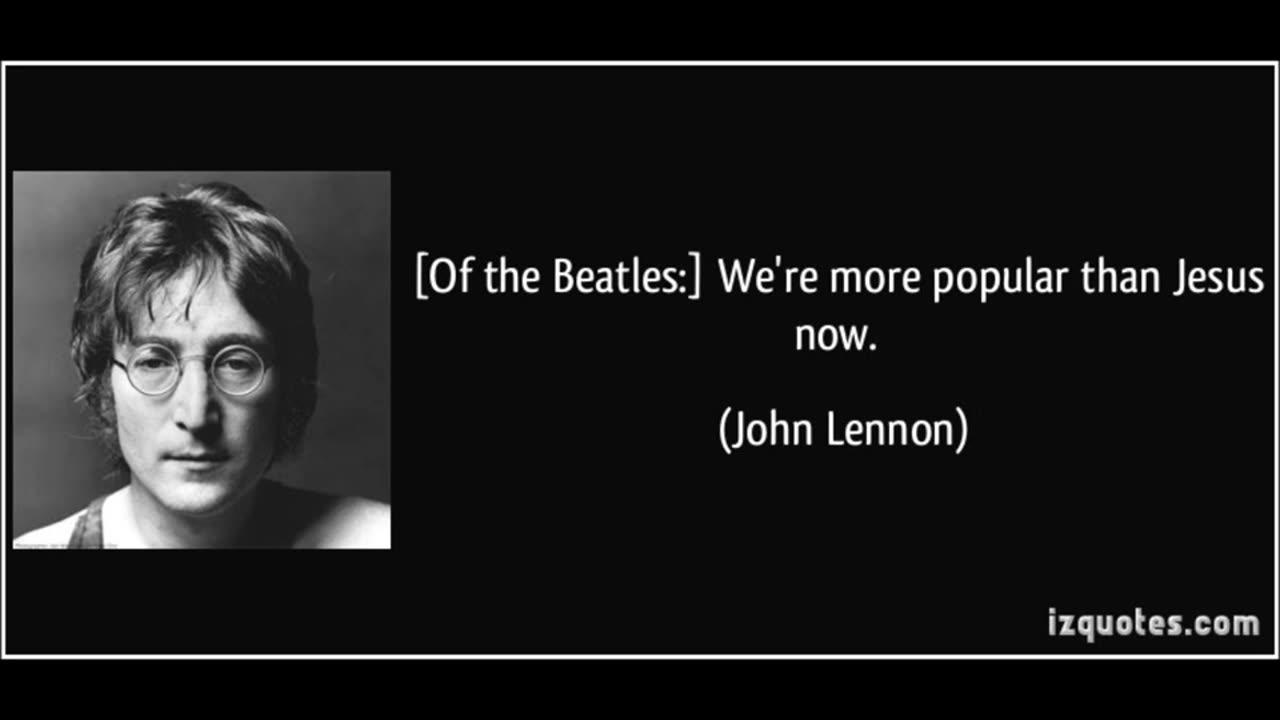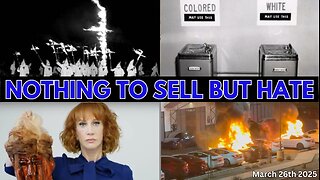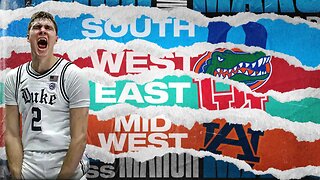Premium Only Content

Warren Jeffs - Rock Music
Prophet and Leader of the FLDS speaks of the rock music and immorality that leads from following the ways of the negro and his music.
Negro
This article is about the historical term. For the outdated race concept, see Negroid. For other uses, see Negro (disambiguation) and Negress (disambiguation).
Not to be confused with nigger.
In the English language, the word negro (or sometimes negress for a female) is a term historically used to denote people considered to be of Black African heritage. The word negro means the color black in both Spanish and in Portuguese (from Latin niger), where English took it from.[1] The term can be construed as offensive, inoffensive, or completely neutral, largely depending on the region or country where it is used, as well as the time period and context in which it is applied. It has various equivalents in other languages of Europe.
In English
A European map of West Africa, 1736. Included is the archaic mapping designation of Negroland.
Around 1442, the Portuguese first arrived in Southern Africa while trying to find a sea route to India.[2][3] The term negro, literally meaning 'black', was used by the Spanish and Portuguese as a simple description to refer to the Bantu peoples that they encountered. Negro denotes 'black' in Spanish and Portuguese, derived from the Latin word niger, meaning 'black', which itself is probably from a Proto-Indo-European root *nekw-, "to be dark", akin to *nokw-, 'night'.[4][5] Negro was also used for the peoples of West Africa in old maps labelled Negroland, an area stretching along the Niger River.
From the 18th century to the late 1960s, negro (later capitalized) was considered to be the proper English-language term for people of black African origin. According to Oxford Dictionaries, use of the word "now seems out of date or even offensive in both British and US English".[1]
A specifically female form of the word, negress (sometimes capitalized), was occasionally used. However, like Jewess, it has completely fallen out of use.
Negroid was used within physical anthropology to denote one of the three purported races of humankind, alongside Caucasoid and Mongoloid. The suffix "-oid" means "similar to". Negroid as a noun was used to designate a wider or more generalized category than Negro; as an adjective, it qualified a noun as in, for example, "negroid features".[6]
United States
This section needs additional citations for verification. Please help improve this article by adding citations to reliable sources in this section. Unsourced material may be challenged and removed.
Find sources: "racial labels" colored Negro Black United States – news · newspapers · books · scholar · JSTOR (February 2022) (Learn how and when to remove this message)
"If on no other issue than this one [the capitalization of the word Negro], Du Bois and Washington were in total agreement; each of them consistently urged the adoption of upper-case treatment by mainstream publications. Du Bois's Suppression and Philadelphia Negro monographs had been among the first to have the noun placed in capitals, and Washington's success in getting Doubleday, Page and Company to capitalize the word in Up From Slavery represented a significant breakthrough."
W. E. B. Du Bois: Biography of a Race, 1868–1919 by David Levering Lewis[7]
Negro superseded colored as the most polite word for African Americans at a time when black was considered more offensive.[8][better source needed][failed verification] In 17th-century colonial America, the term Negro had been also, according to one historian, used to describe Native Americans.[9] John Belton O'Neall's The Negro Law of South Carolina (1848) stipulated that "the term negro is confined to slave Africans, (the ancient Berbers) and their descendants. It does not embrace the free inhabitants of Africa, such as the Egyptians, Moors, or the negro Asiatics, such as the Lascars."[10] The American Negro Academy was founded in 1897, to support liberal arts education. Marcus Garvey used the word in the names of black nationalist and pan-Africanist organizations such as the Universal Negro Improvement Association (founded 1914), the Negro World (1918), the Negro Factories Corporation (1919), and the Declaration of the Rights of the Negro Peoples of the World (1920). W. E. B. Du Bois and Dr. Carter G. Woodson used it in the titles of their non-fiction books, The Negro (1915) and The Mis-Education of the Negro (1933) respectively. Du Bois also used in the titles of his books The Study of the Negro Problems (1898) and The Philadelphia Negro (1899). Negro was accepted as normal, both as exonym and endonym, until the late 1960s, after the later Civil Rights Movement. One example is Martin Luther King Jr. self-identification as Negro in his famous "I Have a Dream" speech of 1963.
Prevalence of negro as a demonym has varied in American English. All-Negro Comics was a 1947 comic anthology written by African-American writers and featuring black characters.
However, during the late 1950s and early 1960s, the word Negro began to be criticized as having been imposed by white people, and having connotations of racial subservience and Uncle Tomism. The term Black, in contrast, denoted pride, power, and a rejection of the past. It took root first in more militant groups such as the Black Muslims and Black Panthers, and by 1967, SNCC leader Stokely Carmichael pushed for the abandonment of Negro. After the Newark riots in the summer of 1967, one third to one half of young Black males polled in Newark self-identified as Black. The term coexisted for a while with Negro, with the newer term initially referring only to progressive or radical Blacks, while Negro was used more for the Black establishment.[11]: 499 Malcolm X preferred Black to Negro, but also started using the term Afro-American after leaving the Nation of Islam.[12]
Since the late 1960s, various other terms have been more widespread in popular usage. These include Black, Black African, Afro-American (in use from the late 1960s to 1990) and African American.[13] The word Negro fell out of favor by the early 1970s and major media including Associated Press and The New York Times stopped using it that decade.[14] However, many older African Americans initially found the term black more offensive than Negro.
The term Negro is still used in some historical contexts, such as the songs known as Negro spirituals, the Negro leagues of baseball in the early and mid-20th century, and organizations such as the United Negro College Fund.[15][16] The academic journal published by Howard University since 1932 still bears the title Journal of Negro Education, but others have changed: e.g. the Association for the Study of Negro Life and History (founded 1915) became the Association for the Study of Afro-American Life and History in 1973, and is now the Association for the Study of African American Life and History; its publication The Journal of Negro History became The Journal of African American History in 2001. Margo Jefferson titled her 2015 book Negroland: A Memoir to evoke growing up in the 1950s and 1960s in the African-American upper class.
African-American linguist John McWhorter has bemoaned attacks on the use of Negro in "utterances or written reproductions of the word when referring to older texts and titles". He cites reports that performances or publishing of certain works (William L. Dawson's Negro Folk Symphony, and an anthology of Norman Mailer's works) have been avoided, "out of wariness of the word 'Negro'” used in titles; and of "two cases" between 2020-2021 "of white college professors having complaints filed against them by students for using the word 'Negro' in class when quoting older texts."[17]
The United States Census Bureau included Negro on the 2010 Census, alongside Black and African-American, because some older black Americans still self-identify with the term.[18][19][20] The U.S. Census used the grouping "Black, African-American, or Negro". Negro was used in an effort to include older African Americans who more closely associate with the term.[21] In 2013, the census removed the term from its forms and questionnaires.[22] The term has also been censored by some newspaper archives.[23]
Liberia
The constitution of Liberia limits Liberian nationality to Negro people (see also Liberian nationality law).[24] People of other racial origins, even if they have lived for many years in Liberia, are thus precluded from becoming citizens of the Republic.[25]
In other languages
Spanish language
In Spanish, negro (feminine negra) is most commonly used for the color black, but it can also be used to describe people with dark-colored skin. In Spain, Mexico, and almost all of Latin America, negro (lower-cased, as ethnonyms are generally not capitalized in Romance languages) means just 'black colour' and does not refer by itself to any ethnic or race unless further context is provided. As in English, this Spanish word is often used figuratively and negatively, to mean 'irregular' or 'undesirable', as in mercado negro ('black market'). However, in most Spanish-speaking countries, negro and negra are commonly as a form of endearment, when used to refer to partners or close friends.[26]
Spanish East Indies
"Negritos o Aetas" illustration in Bosquejo Geográfico e Histórico-natural del Archipielago Filipino (Ramón Jordana y Morera, 1885)
In the Philippines, which historically had almost no contact with the Atlantic slave trade, the Spanish-derived term negro (feminine negra) is still commonly used to refer to black people, as well as to people with dark-colored skin (both native and foreign). Like in Spanish usage, it has no negative connotations when referring to black people. However, it can be mildly pejorative when referring to the skin color of other native Filipinos due to traditional beauty standards. The use of the term for the color black is restricted to Spanish phrases or nouns.[27][28]
Negrito (feminine negrita) is also a term used in the Philippines to refer to the various darker-skinned native ethnic groups that partially descended from early Australo-Melanesian migrations. These groups include the Aeta, Ati, Mamanwa, and the Batak, among others. Despite physical appearances, they all speak Austronesian languages and are genetically related to other Austronesian Filipinos. The island of Negros is named after them.[29] The term Negrito has entered scientific usage in the English language based on the original Spanish/Filipino usage to refer to similar populations in South and Southeast Asia.[30] However, the appropriateness of using the word to bundle people of similar physical appearances has been questioned as genetic evidence show they do not have close shared ancestry.[31][32]
Other Romance languages
Italian
In Italian, negro was the archaic form of the adjective nero; as such, the previous form can still be found in literary texts or in surnames (cfr. the English-language surname Black), while the latter form is the only one currently used today. However, the word could also be used as a noun and at a certain point it was commonly used as term equivalent to English negro, but without its offensive connotation. However, under influence from English-speaking cultures, by the 1970s it had been replaced with nero and di colore. Nero was considered a better translation of the English word black, while di colore is a loan translation of the English word colored.[33]
The noun is considered offensive today,[34][35][36] but some attestations of the previous use can still be found.[37]
In Italian law, Act No. 654 of 13 October 1975 (known as the "Reale Act"), as amended by Act No. 205 of 25 June 1993 (known as the "Mancino Act") and Act No. 85 of 24 February 2006, criminalizes incitement to and racial discrimination itself, incitement to and racial violence itself, the promotion of ideas based on racial superiority or ethnic or racist hatred and the setting up or running of, participation in or support to any organisation, association, movement or group whose purpose is the instigation of racial discrimination or violence.[38][39] As the Council of Europe noted in its 2016 report, "the wording of the Reale Act does not include language as ground of discrimination, nor is [skin] color included as a ground of discrimination."[39] However, the Supreme Court, in affirming a lower-court decision, declared that the use of the term negro by itself, if it has a clearly offensive intention, may be punishable by law,[40] and is considered an aggravating factor in a criminal prosecution.[41]
French
Street plate in Medina of Tunis showing, in Arabic and French, Negroes street
In the French language, the existential concept of negritude ('blackness') was developed by the Senegalese politician Léopold Sédar Senghor. The word can still be used as a synonym of sweetheart in some traditional Louisiana French creole songs.[42] The word nègre as a racial term fell out of favor around the same time as its English equivalent negro. Its usage in French today (nègre littéraire) has shifted completely, to refer to a ghostwriter (écrivain fantôme), i.e. one who writes a book on behalf of its nominal author, usually a non-literary celebrity. However, French Ministry of Culture guidelines (as well as other official entities of Francophone regions[43]) recommend the usage of alternative terms.
Haitian Creole
In Haitian Creole, the word nèg (derived from the French nègre referring to a dark-skinned man), can also be used for any man, regardless of skin color, roughly like the terms guy or dude in American English.
Romanian
In the Romanian language, negru can refer to either the color or a black person (as a neutral term).
Germanic languages
The Dutch word neger was considered to be a neutral term, but since the start of the 21st century it is increasingly considered to be hurtful, condescending and/or discriminatory. The consensus among language advice services of the Flemish Government and Dutch Language Union is to use zwarte persoon/man/vrouw ('black person/man/woman') to denote race instead.[44][45][46][47]
In German, Neger was considered to be a neutral term for black people, but gradually fell out of fashion since the 1970s. Neger is now mostly thought to be derogatory or racist.
In Denmark, usage of neger is up for debate. Linguists and others argue that the word has a historical racist legacy that makes it unsuitable for use today. Mainly older people use the word neger with the notion that it is a neutral word paralleling negro. Relatively few young people use it, other than for provocative purposes in recognition that the word's acceptability has declined.[48]
In Swedish and Norwegian, neger used to be considered a neutral equivalent to negro. However, the term gradually fell out of favor between the late 1960s and 1990s. [citation needed]
In West Frisian, the word neger is largely considered to be a neutral term for black people with African roots.[49][50] The word nikker (evil water spirit) is considered to be offensive and derogatory, but not necessarily racist due to the term's historic definition.[50]
Elsewhere
In the Finnish language the word neekeri (cognate with negro) was long considered a neutral equivalent for negro.[51] In 2002, neekeri's usage notes in the Kielitoimiston sanakirja shifted from "perceived as derogatory by some" to "generally derogatory".[51] The name of a popular Finnish brand of chocolate-coated marshmallow treats was changed by the manufacturers from Neekerinsuukko (lit. 'negro's kiss', like the German version) to Brunbergin suukko ('Brunberg's kiss') in 2001.[51] A study conducted among native Finns found that 90% of research subjects considered the terms neekeri and ryssä among the most derogatory epithets for ethnic minorities.[52]
In Turkish, zenci is the closest equivalent to negro. The appellation was derived from the Arabic zanj for Bantu peoples. It is usually used without any negative connotation.
In Russia, the term негр (negr) was commonly used in the Soviet period without any negative connotation, and its use continues in this neutral sense. In modern Russian media, negr is used somewhat less frequently. Чёрный (chyorny, 'black') as an adjective is also used in a neutral sense, and conveys the same meaning as negr, as in чёрные американцы (chyornye amerikantsy, 'black Americans'). Other alternatives to negr are темнокожий (temnokozhy, 'dark-skinned'), чернокожий (chernokozhy, 'black-skinned'). The latter two words are used as both nouns and adjectives. See also Afro-Russian.
See also
Free Negro
Kaffir (racial term)
Nigger
Negrito
Colored
Blackfella
Nigga
Magical Negro, a trope in fiction
The Book of Negroes, a historical document
References
"Negro: definition of Negro in Oxford dictionary (British & World English)". Oxforddictionaries.com. Archived from the original on 9 August 2012. Retrieved 11 May 2014. The word Negro was adopted from Spanish and Portuguese
Thatcher, Oliver. "Vasco da Gama: Round Africa to India, 1497–1498 CE". Modern History Sourcebook. Milwaukee: University Research Extension Co. Retrieved 19 February 2018.
"Vasco da Gama's Voyage of 'Discovery' 1497". South African History Online. Retrieved 19 February 2018.
The American Heritage Dictionary of the English Language. Boston: Houghton Mifflin. 2000. p. 2039. ISBN 0-395-82517-2.
Mann, Stuart E. (1984). An Indo-European Comparative Dictionary. Hamburg: Helmut Buske Verlag. p. 858. ISBN 3-87118-550-7.
"Queen Charlotte of Britain". pbs.org. Retrieved 19 May 2013.
Lewis, David Levering (1993). W. E. B. Du Bois: Biography of a Race, 1868–1919. Henry Holt. p. 385. ISBN 0-8050-2621-5.
Nguyen, Elizabeth. "Origins of Black History Month", Spartan Daily, Campus News. San Jose State University. 24 February 2004. Accessed 12 April 2008. Archived 2 October 2011 at the Wayback Machine
"6 Shocking Facts About Slavery, Natives and African Americans". Indian Country Today Media Network. 9 October 2013. Archived from the original on 9 October 2013. Retrieved 30 November 2021.
O'Neall, John Belton. "The Negro Law of South Carolina". Internet Archive. Printed by J.G. Bowman. Retrieved 1 June 2018. Public Domain This article incorporates text from this source, which is in the public domain.
Smith, Tom W (1992), "Changing Racial Labels: From 'Colored' to 'Negro' to 'Black' to 'African American'.", The Public Opinion Quarterly, 56 (4), OUP, AAPOR: 496–514, doi:10.1086/269339, JSTOR 2749204
Liz Mazucci, "Going Back to Our Own: Interpreting Malcolm X's Transition From 'Black Asiatic' to 'Afro-American'", Souls 7(1), 2005, pp. 66–83.
Christopher H. Foreman, The African-American predicament, Brookings Institution Press, 1999, p. 99.
"When Did the Word Negro Become Socially Unacceptable? - 2010 - Question of the Month - Jim Crow Museum". jimcrowmuseum.ferris.edu. Retrieved 17 April 2024.
"UNCF New Brand". Uncf.org. Retrieved 19 May 2013.
Quenqua, Douglas (17 January 2008). "Revising a Name, but Not a Familiar Slogan". The New York Times.
McWhorter, John (7 January 2022). "I Can't Brook the Idea of Banning 'Negro'". The New York Times.
U.S. Census Bureau interactive form, Question 9. Accessed 7 January 2010. Archived 8 January 2010 at the Wayback Machine
CBS New York Local News. Accessed 7 January 2010. Archived 9 January 2010 at the Wayback Machine
"Census Bureau defends 'negro' addition". UPI. 6 January 2010. Retrieved 7 January 2010.
Mcfadden, Katie; Mcshane, Larry (6 January 2010). "Use of word Negro on 2010 census forms raises memories of Jim Crow". Daily News. New York.
Brown, Tanya Ballard (25 February 2013). "No More 'Negro' For Census Bureau Forms And Surveys". NPR. Retrieved 26 June 2021.
"Segregation on buses ruled unconstitutional in 1956". NY Daily News. Retrieved 15 August 2017. Negroes" (http://assets.nydailynews.com/polopoly_fs/1.2428061.1447081601!/img/httpImage/image.jpg_gen/derivatives/article_1200/segregation7a-1-web.jpg) replaced by "[African Americans] {{cite news}}: External link in |quote= (help)
Tannenbaum, Jessie; Valcke, Anthony; McPherson, Andrew (1 May 2009). "Analysis of the Aliens and Nationality Law of the Republic of Liberia". Rochester, NY. doi:10.2139/ssrn.1795122. SSRN 1795122. {{cite journal}}: Cite journal requires |journal= (help)
American Bar Association (May 2009). "ANALYSIS OF THE ALIENS AND NATIONALITY LAW OF THE REPUBLIC OF LIBERIA" (PDF). ABA Rule of Law Initiative.
"negro" in the Diccionario de la Real Academia Española
Rondilla, Joanne Laxamana (2012). Colonial Faces: Beauty and Skin Color Hierarchy in the Philippines and the U.S. (PhD). University of California, Berkeley.
Manalansan IV, Martin F. (2003). Global Divas. Duke University Press. p. 57. ISBN 9780822385172.
del Castillo, Clem (22 October 2015). "A closer look at our indigenous people". SunStar Philippines. Archived from the original on 11 May 2021. Retrieved 21 November 2018.
Snow, Philip. The Star Raft: China's Encounter With Africa. Cornell Univ. Press, 1989 (ISBN 0801495830)
Catherine Hill; Pedro Soares; Maru Mormina; Vincent Macaulay; William Meehan; James Blackburn; Douglas Clarke; Joseph Maripa Raja; Patimah Ismail; David Bulbeck; Stephen Oppenheimer; Martin Richards (2006), "Phylogeography and Ethnogenesis of Aboriginal Southeast Asians" (PDF), Molecular Biology and Evolution, 23 (12), Oxford University Press: 2480–91, doi:10.1093/molbev/msl124, PMID 16982817, archived from the original (PDF) on 9 April 2008
Chaubey, Gyaneshwer; Endicott, Phillip (1 February 2013). "The Andaman Islanders in a regional genetic context: reexamining the evidence for an early peopling of the archipelago from South Asia". Human Biology. 85 (1–3): 153–172. doi:10.3378/027.085.0307. ISSN 1534-6617. PMID 24297224. S2CID 7774927.
Accademia della Crusca, Nero, negro e di colore, 12 ottobre 2012 [IT]
"'Negro'? Per noi è dispregiativo" ("'Negro'? For us it is a derogatory term") by Beppe Severgnini, Corriere Della Sera, 13 May 2013 (in Italian)
"...the most banned word in the politically correct dictionary..." : From "La Kyenge sdogana la parola tabù - Da oggi si può dire 'negro'" ("Kyenge clears the taboo word - From today we can say 'negro'") by Franco Bechis, Libero Quotidiano, 28 May 2014 (in Italian)
See also Racism in Italy
For example, famed 1960s pop singer Fausto Leali was nicknamed il negro bianco ("the white negro") in Italian media on account of his naturally hoarse style of singing. Compare: "Fausto Leali, il 'negro-bianco' compie 70 anni" ("Fausto Leali, the 'white negro', is 70 years old"), Corriere Brescia, 25 October 2014; "Auguri a Fausto Leali, il 'Negro Bianco' compie 70 anni" ("Felicitations to Fausto Leali, the 'White Negro' is 70 years old"), ANSA, 25 October 2014"; Fausto Leali, i 70 anni del Negro Bianco Archived 21 January 2018 at the Wayback Machine" ("Fausto Leali, the 70 years of the White Negro"), Brescia Oggi, 25 October 2014.
Criminal Code of Italy (excerpts), Legislation online
"ECRI Rerport on Italy" by the European Commission Against Racism and Intolerance, Council of Europe, 7 June 2016
"Dare del 'negro' è reato : lo dice la Cassazione" ("Calling out 'negro' is a crime : so says the Supreme Court") by Ivan Francese, Il Giornale, 7 October 2014 (in Italian)
"Razzismo, la Cassazione: 'Insulti, sempre aggravante di discriminazione'" ("Racism, the Supreme Court: 'Insults are always an aggravating factor'"), Quotidiano.net, 15 July 2013
Radio Canada, 1971, "Le Son des Français d'Amérique #3 Les Créoles, interview with Revon Reed
E.g. "prête-plume", Office Québécois de la Langue Française (Quebec Office for the French Language), 2012 (in French)
"Het n-woord". Ninsee
"Standard Dictionary of the Dutch Language: neger". Van Dale (in Dutch). Retrieved 11 August 2020.
"zwarte / neger / negerin". www.taaltelefoon.be (in Dutch). Retrieved 11 August 2020.
"neger". VRT Taal (in Flemish). Retrieved 11 August 2020.
Anne Ringgaard, Journalist. "Hvorfor må man ikke sige neger?". videnskab.dk. Retrieved on 2 January 2016.
"Neger". Taalweb Frysk. Retrieved 21 January 2021.
"Nikker". de Moanne. 9 March 2016. Retrieved 21 January 2021.
Rastas, Anna (2007). Neutraalisti rasistinen? Erään sanan politiikkaa (in Finnish). Tampere: Tampere University Press, 2007. ISBN 978-951-44-6946-6. Archived from the original (PDF) on 19 February 2020. Retrieved 8 February 2009.
Raittila, Pentti (2002). Etnisyys ja rasismi journalismissa (PDF) (in Finnish). Tampere: Tampere University Press. pp. 25–26. ISBN 951-44-5486-3. Archived from the original (PDF) on 13 March 2012. Retrieved 24 May 2010.
External links
Look up negro in Wiktionary, the free dictionary.
Wikimedia Commons has media related to Negro (archaic term).
"Negro" . Collier's New Encyclopedia. 1921.
Nigger
Article
Talk
Read
View source
View history
Tools
Page semi-protected
From Wikipedia, the free encyclopedia
Not to be confused with Negro, Niger, or Niger State. For the colloquial slang term, see Nigga.
Not related to the word "Niggardly".
"N-word" redirects here. For other uses, see N-word (disambiguation) and Nigger (disambiguation).
In the English language, nigger is a racial slur directed at black people. Starting in the 1990s,[1] references to nigger have been increasingly replaced by the euphemism "the N-word", notably in cases where nigger is mentioned but not directly used.[2] In an instance of linguistic reappropriation, the term nigger is also used casually and fraternally among African Americans, most commonly in the form of nigga, whose spelling reflects the phonology of African-American English.[2][3]
The origin of the word lies with the Latin adjective niger ([ˈnɪɡɛr]), meaning "black".[2][3] It was initially seen as a relatively neutral term, essentially synonymous with the English word negro. Early attested uses during the Atlantic slave trade (16th–19th century) often conveyed a merely patronizing attitude. The word took on a derogatory connotation from the mid-18th century onward, and "degenerated into an overt slur" by the middle of the 19th century. Some authors still used the term in a neutral sense up until the later part of the 20th century, at which point the use of nigger became increasingly controversial regardless of its context or intent.[2][3][4]
Because the word nigger has historically "wreaked symbolic violence, often accompanied by physical violence", it began to disappear from general popular culture from the second part of the 20th century onward, with the exception of cases derived from intra-group usage such as hip hop culture.[3] The Merriam-Webster Online Dictionary describes the term as "perhaps the most offensive and inflammatory racial slur in English".[3] The Oxford English Dictionary writes that "this word is one of the most controversial in English, and is liable to be considered offensive or taboo in almost all contexts (even when used as a self-description)".[2] Intra-group usage has been criticized by some contemporary Black American authors, a group of them (the eradicationists) calling for the total abandonment of its usage (even under the variant nigga), which they see as contributing to the "construction of an identity founded on self-hate".[3][5][6][7] In wider society, the inclusion of the word nigger in classic works of literature (as in Mark Twain's 1884 book The Adventures of Huckleberry Finn) and in more recent cultural productions (such as Quentin Tarantino's 1994 film Pulp Fiction and 2012 film Django Unchained) has sparked controversy and ongoing debate.[5][7]
The word nigger has also been historically used to designate "any person considered to be of low social status" (as in the expression white nigger) or "any person whose behavior is regarded as reprehensible". In some cases, with awareness of the word's offensive connotation, but without intention to cause offense, it can refer to a "a victim of prejudice likened to that endured by African Americans" (as in John Lennon's 1972 song "Woman Is the Nigger of the World").[2]
Etymology and history
Main article: Negro
Early use
The variants neger and negar derive from various Romance words for 'black', including the Spanish and Portuguese word negro ('black') and the now-pejorative French nègre. Etymologically, negro, noir, nègre, and nigger ultimately derive from nigrum, the stem of the Latin niger ('black').
In its original English-language usage, nigger (also spelled niger) was a word for a dark-skinned individual. The earliest known published use of the term dates from 1574, in a work alluding to "the Nigers of Aethiop, bearing witnes".[8] According to the Oxford English Dictionary, the first derogatory usage of the term nigger was recorded two centuries later, in 1775.[9]
In the colonial America of 1619, John Rolfe used negars in describing the African slaves shipped to the Virginia colony.[10] Later American English spellings, neger and neggar, prevailed in New York under the Dutch and in metropolitan Philadelphia's Moravian and Pennsylvania Dutch communities; the African Burial Ground in New York City originally was known by the Dutch name Begraafplaats van de Neger (Cemetery of the Negro). An early occurrence of neger in American English dates from 1625 in Rhode Island.[11] Lexicographer Noah Webster suggested the neger spelling in place of negro in his 1806 dictionary.[12]
18th- and 19th-century United States
Lyrics for the song "Run, Nigger, Run", about a fugitive slave escaping from a slave patrol, printed in 1851
During the late 18th and early 19th century, the word "nigger" also described an actual labor category, which African American laborers adopted for themselves as a social identity, and thus white people used the descriptor word as a distancing or derogatory epithet, as if "quoting black people" and their non-standard language.[13] During the early 1800s to the late 1840s fur trade in the Western United States, the word was spelled "niggur", and is often recorded in the literature of the time. George Fredrick Ruxton used it in his "mountain man" lexicon, without pejorative connotation. "Niggur" was evidently similar to the modern use of "dude" or "guy". This passage from Ruxton's Life in the Far West illustrates the word in spoken form—the speaker here referring to himself: "Travler, marm, this niggur's no travler; I ar' a trapper, marm, a mountain-man, wagh!"[14] It was not used as a term exclusively for blacks among mountain men during this period, as Indians, Mexicans, and Frenchmen and Anglos alike could be a "niggur".[15] "The noun slipped back and forth from derogatory to endearing."[16]
By 1859 the term was clearly used to offend, in an attack on abolitionist John Brown.[17]
The term "colored" or "negro" became a respectful alternative. In 1851, the Boston Vigilance Committee, an abolitionist organization, posted warnings to the Colored People of Boston and vicinity. Writing in 1904, journalist Clifton Johnson documented the "opprobrious" character of the word nigger, emphasizing that it was chosen in the South precisely because it was more offensive than "colored" or "negro".[18] By the turn of the century, "colored" had become sufficiently mainstream that it was chosen as the racial self-identifier for the National Association for the Advancement of Colored People (NAACP). In 2008 Carla Sims, its communications director, said "the term 'colored' is not derogatory, [the NAACP] chose the word 'colored' because it was the most positive description commonly used [in 1909, when the association was founded]. It's outdated and antiquated but not offensive."[19]
Mark Twain, in the autobiographic book Life on the Mississippi (1883), used the term within quotes, indicating reported speech, but used the term "negro" when writing in his own narrative persona.[20] Joseph Conrad published a novella in Britain with the title The Nigger of the "Narcissus" (1897); in the United States, it was released as The Children of the Sea: A Tale of the Forecastle; the original had been called "the ugliest conceivable title" in a British review[21] and American reviewers understood the change as reflecting American "refinement" and "prudery."[22]
The US edition of Joseph Conrad's The Nigger of the "Narcissus" was called The Children of the Sea.
20th-century United States
A style guide to British English usage, H.W. Fowler's A Dictionary of Modern English Usage, states in the first edition (1926) that applying the word nigger to "others than full or partial negroes" is "felt as an insult by the person described, & betrays in the speaker, if not deliberate insolence, at least a very arrogant inhumanity"; but the second edition (1965) states "N. has been described as 'the term that carries with it all the obloquy and contempt and rejection which whites have inflicted on blacks'".[23] The quoted formula goes back to the writings of the American journalist Harold R. Isaacs, who used it in several writings between 1963 and 1975.[24] Black characters in Nella Larsen's 1929 novel Passing view its use as offensive; one says "I'm really not such an idiot that I don't realize that if a man calls me a nigger, it's his fault the first time, but mine if he has the opportunity to do it again."[25]
By the late 1960s, the social change brought about by the civil rights movement had legitimized the racial identity word black as mainstream American English usage to denote black-skinned Americans of African ancestry. President Thomas Jefferson had used this word of his slaves in his Notes on the State of Virginia (1785), but "black" had not been widely used until the later 20th century. (See black pride, and, in the context of worldwide anti-colonialism initiatives, Négritude.)
In the 1980s, the term "African American" was advanced analogously to such terms as "German American" and "Irish American", and was adopted by major media outlets. Moreover, as a compound word, African American resembles the vogue word Afro-American, an early-1970s popular usage. Some Black Americans continue to use the word nigger, often spelled as nigga and niggah, without irony, either to neutralize the word's impact or as a sign of solidarity.[26]
Usage
Surveys from 2006 showed that the American public widely perceived usage of the term to be wrong or unacceptable, but that nearly half of whites and two-thirds of blacks knew someone personally who referred to blacks by the term.[27] Nearly one-third of whites and two-thirds of blacks said they had personally used the term within the last five years.[27]
In names of people, places and things
Main article: Use of nigger in proper names
Political use
Historical American cartoon titled "Why the nigger is not fit to vote", by Thomas Nast, arguing the reason Democrats objected to African-Americans having the vote was that, in the 1868 US presidential election, African-Americans voted for the Republican candidates Ulysses S. Grant and Schuyler Colfax. "Seymour friends meet here" in the background is a reference to the Democratic Party candidate: Horatio Seymour.
"Niggers in the White House"[28] was written in reaction to an October 1901 White House dinner hosted by Republican President Theodore Roosevelt, who had invited Booker T. Washington—an African-American presidential advisor—as a guest. The poem reappeared in 1929 after First Lady Lou Hoover, wife of President Herbert Hoover, invited Jessie De Priest, the wife of African-American congressman Oscar De Priest, to a tea for congressmen's wives at the White House.[29] The identity of the author—who used the byline "unchained poet"—remains unknown.
In explaining his refusal to be conscripted to fight the Vietnam War (1955–75), professional boxer Muhammad Ali said, "No Vietcong ever called me nigger."[30] Later, his modified answer was the title of a documentary, No Vietnamese Ever Called Me Nigger (1968), about the front-line lot of the U.S. Army black soldier in combat in Vietnam.[31] An Ali biographer reports that, when interviewed by Robert Lipsyte in 1966, the boxer actually said, "I ain't got no quarrel with them Viet Cong."[32]
On February 28, 2007, the New York City Council symbolically banned the use of the word nigger; however, there is no penalty for using it. This formal resolution also requests excluding from Grammy Award consideration every song whose lyrics contain the word; however, Ron Roecker, vice president of communication for the Recording Academy, doubted it will have any effect on actual nominations.[33][34]
The word can be invoked politically for effect. When Detroit mayor Kwame Kilpatrick came under intense scrutiny for his conduct in 2008, he deviated from an address to the city council, saying, "In the past 30 days, I've been called a nigger more than any time in my entire life." Opponents accused him of "playing the race card" to save his political life.[35]
Cultural use
Main article: Use of nigger in the arts
The implicit racism of the word nigger has generally rendered its use taboo. Magazines and newspapers typically do not use this word but instead print censored versions such as "n*gg*r", "n**ger", "n——" or "the N-word";[36] see below.
1885 illustration from Mark Twain's Adventures of Huckleberry Finn, captioned "Misto Bradish's nigger"
The use of nigger in older literature has become controversial because of the word's modern meaning as a racist insult. One of the most enduring controversies has been the word's use in Mark Twain's novel Adventures of Huckleberry Finn (1885). Huckleberry Finn was the fifth most challenged book during the 1990s, according to the American Library Association.[37] The novel is written from the point of view, and largely in the language, of an uneducated white boy, who is drifting down the Mississippi River on a raft with an adult escaped slave, Jim. The word "nigger" is used (mostly about Jim) over 200 times.[38][39] Twain's advocates note that the novel is composed in then-contemporary vernacular usage, not racist stereotype, because Jim, the black man, is a sympathetic character.
In 2011, a new edition published by NewSouth Books replaced the word "nigger" with "slave" and also removed the word "injun". The change was spearheaded by Twain scholar Alan Gribben in the hope of "countering the 'pre-emptive censorship'" that results from the book's being removed from school curricula over language concerns.[40][41] The changes sparked outrage from critics Elon James, Alexandra Petri and Chris Meadows.[42]
In his 1999 memoir All Souls, Irish-American Michael Patrick MacDonald describes how many white residents of the Old Colony Housing Project in South Boston used this meaning to degrade the people considered to be of lower status, whether white or black.[43]
Of course, no one considered himself a nigger. It was always something you called someone who could be considered anything less than you. I soon found out there were a few black families living in Old Colony. They'd lived there for years and everyone said that they were okay, that they weren't niggers but just black. It felt good to all of us to not be as bad as the hopeless people in D Street or, God forbid, the ones in Columbia Point, who were both black and niggers. But now I was jealous of the kids in Old Harbor Project down the road, which seemed like a step up from Old Colony ...
In an academic setting
The word's usage in literature has led to it being a point of discussion in university lectures as well. In 2008, Arizona State University English professor Neal A. Lester created what has been called "the first ever college-level class designed to explore the word 'nigger'".[44] Starting in the following decade, colleges struggled with attempts to teach material about the slur in a sensitive manner. In 2012, a sixth grade Chicago teacher Lincoln Brown was suspended after repeating the contents of a racially charged note being passed around in class. Brown later filed a federal civil rights lawsuit against the headmaster and the Chicago public schools.[45] A New Orleans high school also experienced controversy in 2017.[46] Such increased attention prompted Elizabeth Stordeur Pryor, the daughter of Richard Pryor and a professor at Smith College, to give a talk opining that the word was leading to a "social crisis" in higher education.[47]
In addition to Smith College, Emory University, Augsburg University, Southern Connecticut State University, and Simpson College all suspended professors in 2019 over referring to the word "nigger" by name in classroom settings.[48][49][50] In two other cases, a professor at Princeton decided to stop teaching a course on hate speech after students protested his utterance of "nigger" and a professor at DePaul had his law course cancelled after 80% of the enrolled students transferred out.[51][52] Instead of pursuing disciplinary action, a student at the College of the Desert challenged his professor in a viral class presentation which argued that her use of the word in a lecture was not justified.[53]
In the workplace
In 2018, the head of the media company Netflix, Reed Hastings, fired his chief communications officer, Jonathan Friedland, for using the word twice during internal discussions about sensitive words.[54] In explaining why, Hastings wrote:
[The word's use] in popular media like music and film have created some confusion as to whether or not there is ever a time when the use of the N-word is acceptable. For non-Black people, the word should not be spoken as there is almost no context in which it is appropriate or constructive (even when singing a song or reading a script). There is not a way to neutralize the emotion and history behind the word in any context. The use of the phrase 'N-word' was created as a euphemism, and the norm, with the intention of providing an acceptable replacement and moving people away from using the specific word. When a person violates this norm, it creates resentment, intense frustration, and great offense for many.[55]
The following year, screenwriter Walter Mosley turned down a job after his human resources department took issue with him using the word to describe racism that he experienced as a black man.[56]
While defending Laurie Sheck, a professor who was cleared of ethical violations for quoting I Am Not Your Negro by James Baldwin, John McWhorter wrote that efforts to condemn racist language by white Americans had undergone mission creep.[57] Similar controversies outside the United States have occurred at the University of Western Ontario in Canada and the Madrid campus of Syracuse University.[58][59] In June 2020, Canadian news host Wendy Mesley was suspended and replaced with a guest host after she attended a meeting on racial justice and, in the process of quoting a journalist, used "a word that no-one like me should ever use".[60] In August 2020, BBC news, with the agreement of victim and family, mentioned the slur when reporting on a physical and verbal assault on the black NHS worker and musician K-Dogg. Within the week the BBC received over 18,600 complaints, the black radio host David Whitely resigned in protest, and the BBC apologized.[61]
In 2021, in Tampa, Florida, a 27-year-old black employee at a Dunkin' Donuts punched a 77-year-old white customer after the customer had repeatedly called the employee a nigger.[62] The customer fell to the floor and hit his head. Three days later, he died, having suffered a skull fracture and brain contusions. The employee was arrested, and charged with manslaughter. In a plea bargain, the employee pled guilty to felony battery, and was sentenced to two years of house arrest. In 2022, in explaining why the employee did not receive any jail time, Grayson Kamm, a spokesman for Hillsborough State Attorney Andrew Warren, said "Two of the primary factors were the aggressive approach the victim took toward the defendant and everyone working with the defendant, and that the victim repeatedly used possibly the most aggressive and offensive term in the English language."[63]
Intra-group versus intergroup usage
Main article: Nigga
See also: Ingroups and outgroups
Black listeners often react to the term differently, depending on whether it is used by white speakers or by black speakers. In the former case, it is regularly understood as insensitive or insulting; in the latter, it may carry notes of in-group disparagement, or it may be understood as neutral or affectionate, a possible instance of reappropriation.[64]
In the black community, nigger is often rendered as nigga. This usage has been popularized by the rap and hip-hop music cultures and is used as part of an in-group lexicon and speech. It is not necessarily derogatory and is often used to mean homie or friend.[65]
Acceptance of intra-group usage of the word nigga is still debated,[65] although it has established a foothold amongst younger generations. The NAACP denounces the use of both nigga and nigger. Usage of nigga by mixed-race individuals is still largely considered taboo,[a] albeit not as inflammatory as nigger. As of 2001, trends indicated that usage of the term in intragroup settings is increasing even amongst white youth, due to the popularity of rap and hip hop culture.[66] Linguist Keith Allan rejects the view that nigger is always a slur, arguing that it is also used as a marker of camaraderie and friendship, comparable to the British and Australian term "mate" or the American "buddy".[67]
According to Arthur K. Spears in Diverse Issues in Higher Education, 2006:
In many African-American neighborhoods, nigga is simply the most common term used to refer to any male, of any race or ethnicity. Increasingly, the term has been applied to any person, male or female. "Where y'all niggas goin?" is said with no self-consciousness or animosity to a group of women, for the routine purpose of obtaining information. The point: nigga is evaluatively neutral in terms of its inherent meaning; it may express positive, neutral, or negative attitudes;[68]
Kevin Cato, meanwhile, observes:
For instance, a show on Black Entertainment Television, a cable network aimed at a Black audience, described the word nigger as a "term of endearment". "In the African American community, the word nigga. (not nigger) brings out feelings of pride." (Davis 1). Here the word evokes a sense of community and oneness among Black people. Many teens I interviewed felt the word had no power when used amongst friends, but when used among white people the word took on a completely different meaning. In fact, comedian Alex Thomas on BET stated, "I still better not hear no white boy say that to me ... I hear a white boy say that to me, it means 'White boy, you gonna get your ass beat.'"[69]
Addressing the use of nigger by black people, philosopher and public intellectual Cornel West said in 2007:
There's a certain rhythmic seduction to the word. If you speak in a sentence, and you have to say cat, companion, or friend, as opposed to nigger, then the rhythmic presentation is off. That rhythmic language is a form of historical memory for Black people ... When Richard Pryor came back from Africa, and decided to stop using the word onstage, he would sometimes start to slip up, because he was so used to speaking that way. It was the right word at the moment to keep the rhythm together in his sentence making.[70]
2010s: increase in use and controversy
In the 2010s, "nigger" in its various forms saw use with increasing frequency by African Americans amongst themselves or in self-expression, the most common swear word in hip hop music lyrics.[71][72] Ta-Nehisi Coates suggested that it continues to be unacceptable for non-blacks to utter while singing or rapping along to hip-hop, and that by being so restrained it gives white Americans (specifically) an impression of what it is like to not be entitled to "do anything they please, anywhere". A concern often raised is whether frequent exposure will inevitably lead to a dilution of the extremely negative perception of the word among the majority of non-black Americans who currently consider its use unacceptable and shocking.[73]
Related words
Derivatives
Anti-abolitionist cartoon from the 1860 presidential campaign illustrating colloquial usage of "Nigger in the woodpile"
In several English-speaking countries, "Niggerhead" or "nigger head" was used as a name for many sorts of things, including commercial products, places, plants and animals, as a descriptive term (lit. 'black person's head'). It also is or was a colloquial technical term in industry, mining, and seafaring. Nigger as "defect" (a hidden problem), derives from "nigger in the woodpile", a US slave-era phrase denoting escaped slaves hiding in train-transported woodpiles.[74] In the 1840s, the Morning Chronicle newspaper report series London Labour and the London Poor, by Henry Mayhew, records the usages of both "nigger" and the similar-sounding word "niggard" denoting a false bottom for a grate.[75]
In American English, "nigger lover" initially applied to abolitionists, then to white people sympathetic towards black Americans.[76] The portmanteau word wigger ('White' + 'nigger') denotes a white person emulating "street Black behavior", hoping to gain acceptance to the hip hop, thug, and gangsta sub-cultures. Norman Mailer wrote of the antecedents of this phenomenon in 1957 in his essay The White Negro.
The N-word euphemism
Notable usage[77]
The prosecutor [Christopher Darden], his voice trembling, added that the "N-word" was so vile he would not utter it. "It's the filthiest, dirtiest, nastiest word in the English language."
— Kenneth B. Noble, January 14, 1995 The New York Times[78]
One of the first uses of the N-word euphemism by a major public figure came during the racially contentious O. J. Simpson murder case in 1995. Key prosecution witness Detective Mark Fuhrman, of the Los Angeles Police Department—who denied using racist language on duty—impeached himself with his prolific use of nigger in tape recordings about his police work. Co-prosecutor Christopher Darden refused to say the actual word, calling it "the filthiest, dirtiest, nastiest word in the English language". Media personnel who reported on Fuhrman's testimony substituted the N-word for nigger.[79][80]
Similar-sounding words
Niger (Latin for "black") occurs in Latinate scientific nomenclature and is the root word for some homophones of nigger; sellers of niger seed (used as bird feed), sometimes use the spelling Nyjer seed. The classical Latin pronunciation /ˈniɡeɾ/ sounds similar to the English /ˈnɪɡər/, occurring in biologic and anatomic names, such as Hyoscyamus niger (black henbane), and even for animals that are in fact not black, such as Sciurus niger (fox squirrel).
Nigra is the Latin feminine form of niger (black), used in biologic and anatomic names such as substantia nigra (black substance).
The word niggardly (miserly) is etymologically unrelated to nigger, derived from the Old Norse word nig (stingy) and the Middle English word nigon. In the US, this word has been misinterpreted as related to nigger and taken as offensive. In January 1999, David Howard, a white Washington, D.C., city employee, was compelled to resign after using niggardly—in a financial context—while speaking with black colleagues, who took umbrage. After reviewing the misunderstanding, Mayor Anthony A. Williams offered to reinstate Howard to his former position. Howard refused reinstatement but took a job elsewhere in the mayor's government.[81]
Spanish: Negro [ˈne.ɣ̞ɾo] is the Spanish word for black, and is commonly a part of place names and proper names, particularly in the Southwest of the United States.
Denotational extension
Graffiti in Palestine referring to Arabs as "sand-niggers"
The denotations of nigger also include non-black/non-white and other disadvantaged people. Some of these terms are self-chosen, to identify with the oppression and resistance of black Americans; others are ethnic slurs used by outsiders.
Jerry Farber's 1967 essay collection, The Student as Nigger, used the word as a metaphor for what he saw as the role forced on students. Farber had been, at the time, frequently arrested as a civil rights activist while beginning his career as a literature professor.
In his 1968 autobiography White Niggers of America: The Precocious Autobiography of a Quebec "Terrorist", Pierre Vallières, a Front de libération du Québec leader, refers to the oppression of the Québécois people in North America.
In 1969, in the course of being interviewed by the British magazine Nova, artist Yoko Ono said "woman is the nigger of the world;" three years later, her husband, John Lennon, published the song of the same name—about the worldwide phenomenon of discrimination against women—which was socially and politically controversial to US sensibilities.
Sand nigger, an ethnic slur against Arabs, and timber nigger and prairie nigger, ethnic slurs against Native Americans, are examples of the racist extension of nigger upon other non-white peoples.[82]
In 1978, singer Patti Smith used the word in "Rock N Roll Nigger". One year later in 1979, English singer Elvis Costello used the phrase "white nigger" in his song "Oliver's Army". The slur usually remains uncensored on radio stations, but Costello's usage of the word came under scrutiny, particularly after he used racial slurs during a drunken argument with Stephen Stills and Bonnie Bramlett in 1979. In the same year, Costello's father published a letter in Rolling Stone defending his son against accusations of racism, stating "Nothing could be further from the truth. My own background has meant that I am passionately opposed to any form of prejudice based on religion or race... His mother comes from the tough multiracial area of Liverpool, and I think she would still beat the tar out of him if his orthodoxy were in doubt".[83]
Historian Eugene Genovese, noted for bringing a Marxist perspective to the study of power, class, and relations between planters and slaves in the South, uses the word pointedly in The World the Slaveholders Made (1988).
For reasons common to the slave condition all slave classes displayed a lack of industrial initiative and produced the famous Lazy Nigger, who under Russian serfdom and elsewhere was white. Just as not all Blacks, even under the most degrading forms of slavery, consented to become niggers, so by no means all or even most of the niggers in history have been Black.
The editor of Green Egg, a magazine described in The Encyclopedia of American Religions as a significant periodical, published an essay entitled "Niggers of the New Age". This argued that Neo-Pagans were treated badly by other parts of the New Age movement.[84]
Other languages
This section needs additional citations for verification. Please help improve this article by adding citations to reliable sources in this section. Unsourced material may be challenged and removed. (December 2023) (Learn how and when to remove this message)
Other languages, particularly Romance languages, have words that sound similar to or share etymological roots with nigger but do not necessarily mean the same. In some of these languages, the words refer to the color black in general and are not specifically used to refer to black people. When used to refer to black people, these words have acquired varying degrees of offensiveness, ranging from completely neutral (as in Spanish negro) to highly racist (as in Finnish Neekeri). Examples of related words in other languages include:
Dutch: Neger ('negro') used to be neutral, but many now consider it to be avoided in favor of zwarte ('black').[85][86][87][88] Zwartje ('little black one') can be amicably or offensively used. Nikker is always pejorative.[89]
Finnish: Neekeri ('negro/nigger'), as a loan word ('Neger') from the Swedish language appeared for the first time in a book published in 1771.[90] The use of the Finnish equivalent ('neekeri') began in the late 19th century. Until the 1980s, it was commonly used and generally not yet considered derogatory, although a few instances of it being considered to be so have been documented since the 1950s; by the mid-1990s the word was considered racist, especially in the metropolitan area and among the younger population.[91] It has since then usually been replaced by the metonym 'musta' ('black [person]').[92] In a survey conducted in 2000, Finnish respondents considered the term 'Neekeri' to be among the most offensive of minority designations.[93]
French: Nègre is now considered derogatory. Although Nègre littéraire was the standard term for a ghostwriter, it has largely been supplanted by prête-plume. Some white Frenchmen have the surname Nègre. The word can still be used as a synonym of "sweetheart" in some traditional Louisiana French creole songs.
German: Neger is dated and now considered offensive. Schwarze/-r ('black [person]') or Farbige/-r ("colored [person]") is more neutral.
Haitian Creole: nèg is used for any man in general, regardless of skin color (like dude in American English). Haitian Creole derives predominantly from French.
Italian has three variants: negro, nero and di colore. The first one is the most historically attested and was the most commonly used until the 1960s as an equivalent of the English word "negro". It was gradually felt as offensive during the 1970s and replaced with nero and di colore. Nero was considered a better translation of the English word black, while di colore is a loan translation of the English word colored.[94]
Portuguese: Negro (as well as preto) is neutral;[95] nevertheless preto can be offensive or at least "politically incorrect" and is almost never proudly used by Afro-Brazilians. Crioulo and macaco are always extremely pejorative.[96]
Romanian: Negrotei is derogatory;[97]
Russian: the word негр (negr) has been commonly used as neutral word to describe black people until recent years. It can also be used as a synonym for underpaid worker, "литературный негр" (literaturny negr) means ghostwriter.[98][99][100] Nowadays, a black person would often be described neutrally as "чернокожий" (chernokozhij, 'black-skinned'), though the organization Help Needed instead recommends "темнокожий" (temnokozhij, 'dark-skinned').[101]
Spanish: Negro is the word for "black" and is the only way to refer to that color.[102]
Turkish: Zenci is a word for "black" but it is being used in a derogatory manner in a similar way as the word nigger.
Bulgarian: Негър (negar), loaned from French nègre, is considered a neutral word for black people in Bulgaria. Some publications and institutions use чернокож or тъмнокож, but the use of негър is more widespread.
See also
List of ethnic slurs
List of ethnic group names used as insults
Kaffir (ethnic slur)
Blackfella
Guilty or Innocent of Using the N Word, a 2006 documentary
List of topics related to the African diaspora
"With Apologies to Jesse Jackson", an episode of South Park with a plot revolving around the word's extreme offensiveness
Golliwog
Notes
Whether this usage is considered acceptable may depend on a sense of the speaker's in-group belonging, as judged by the speaker him- or herself, the listener(s), or others.
References
"Google Ngram". Google Ngram. Retrieved January 18, 2024.
Oxford English Dictionary Online, s.v. nigger, n. and adj.; neger, n. and adj.; N-word, n.
Rahman, Jacquelyn (2012). "The N Word: Its History and Use in the African American Community". Journal of English Linguistics. 40 (2): 137–171. doi:10.1177/0075424211414807. ISSN 0075-4242. S2CID 144164210.
McWhorter, John (April 30, 2021). "Opinion | How the N-Word Became Unsayable". The New York Times – via NYTimes.com.
Kennedy, Randall (2002). Nigger: The Strange Career of a Troublesome Word. Pantheon Books. pp. 36–37, 91–111. ISBN 978-0-9650397-7-2.
Asim, Jabari (2008). The N Word: Who Can Say It, Who Shouldn't, and Why. HMH. ISBN 978-0-547-52494-8.
Allan, Keith (2015). "When is a Slur Not a Slur? The Use of Nigger in 'Pulp Fiction'". Language Sciences. 52: 187–199. doi:10.1016/j.langsci.2015.03.001.
Patricia T. O'Conner; Stewart Kellerman (2010). Origins of the Specious: Myths and Misconceptions of the English Language. Random House Publishing Group. p. 134. ISBN 978-0-8129-7810-0. Retrieved August 18, 2017.
Peterson, Christopher (2013). Bestial Traces:Race, Sexuality, Animality: Race, Sexuality, Animality. Fordham Univ Press. p. 91. ISBN 978-0-8232-4520-8. Retrieved August 18, 2017.
Kennedy, Randall (January 11, 2001). "Nigger: The Strange Career of a Troublesome Word". The Washington Post. Retrieved August 17, 2007. (Book review)
Hutchinson, Earl Ofari (1996). The Assassination of the Black Male Image. Simon and Schuster. p. 82. ISBN 978-0-684-83100-8.
Mencken, H. L. (1921). "Chapter 8. American Spelling > 2. The Influence of Webster". The American Language: An Inquiry into the Development of English in the United States (2nd rev. and enl. ed.). New York: A.A. Knopf.
Stordeur Pryor, Elizabeth (Summer 2016). "The Etymology of Nigger: Resistance, Language, and the Politics of Freedom in the Antebellum North". Journal of the Early Republic. 36 (2): 203–245. doi:10.1353/jer.2016.0028. S2CID 148122937. Retrieved February 26, 2021. = Stordeur Pryor, Elizabeth (Summer 2016). "The Etymology of Nigger: Resistance, Language, and the Politics of Freedom in the Antebellum North". Smith ScholarWorks. Northampton, Massachusetts: Smith College: 203–245, especially 206 f. Retrieved February 26, 2021.
Ruxton, George Frederick (1846). Life In the Far West. University of Oklahoma Press. ISBN 978-0-8061-1534-4.
"Language of the Rendezvous". Archived from the original on November 19, 2012. Retrieved September 6, 2012.
Coleman, Jon (2012). Here Lies Hugh Glass: A Mountain Man, a Bear, and the Rise of the American Nation. Macmillan. p. 272. Retrieved November 21, 2016.[permanent dead link]
"A new version of an old song. Illustrating the growth of Public Sentiment [Old John Brown, he had a little nigger]". The National Era (Washington, D.C.). November 10, 1859. p. 3 – via newspapers.com.
Johnson, Clifton (October 14, 1904). "They Are Only "Niggers" in the South". The Seattle Republ
-
 LIVE
LIVE
Dear America
9 hours agoTrump Signs HISTORIC Executive Orders! + Russia Hoax Documents To Be Declassified!
4,142 watching -
 LIVE
LIVE
Wendy Bell Radio
4 hours agoNothing To Sell But Hate
8,120 watching -
 1:24:30
1:24:30
JULIE GREEN MINISTRIES
2 hours agoLIVE WITH JULIE
88.9K114 -
 1:17:38
1:17:38
Game On!
15 hours ago $2.31 earned2025 Sweet 16: Chalk or are UPSETS brewing?
26.8K -
 LIVE
LIVE
Jeff Ahern
1 hour agoNever Woke Wednesday with Jeff Ahern
232 watching -
 6:00
6:00
Melonie Mac
16 hours agoRippaverse Yaira Statue Unboxing!
34.5K28 -
 23:51
23:51
Shea Whitney
1 day ago $3.23 earned30 *INSANE* Amazon SPRING PRIME DAY Deals 2025!
29.3K7 -
 11:36
11:36
NinjaGamblers
21 hours ago $2.38 earnedBest Way to Win Big on Roulette with Bonus Multipliers: the Turbo Method
37.2K3 -
 12:42
12:42
ARFCOM Reviews
19 hours ago $1.18 earnedThe Texas Edition Subcompact EDC | Rost Martin RM1S
29.2K3 -
 33:23
33:23
Uncommon Sense In Current Times
18 hours ago $1.78 earned“Woke” Workplaces are Killing America | Andrew Crapuchettes
30.8K3